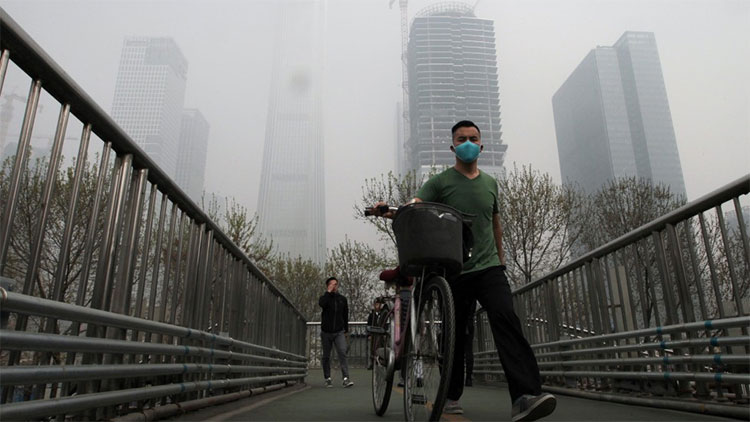Growing wild plants, Beijing turned into a huge pollution trap?
Beijing's large-scale greenery campaign worsens air pollution in the city, South China Morning Post (SCMP) reported August 31.
The "Great Green Wall" project reduces 15% of the ability to disperse ultra-fine dust, or (less than 2.5 micrometers in diameter) during a serious air pollution in Beijing in January / 2014, according to research published in the scientific journal Atmospheric Chemistry and Physics earlier this month.
The study was conducted jointly by experts from the Earth Environment Research Institute, Chinese Academy of Sciences, and the US National Center for Atmospheric Research.

"The more trees, the more dust and smoke" has become a popular saying to Beijing people.(Photo: SCMP).
At the time of heavy dust pollution throughout the study period, PM 2.5 reached 350 micrograms / m 3 of air, 14 times higher than the recommended safety level by the World Health Organization (WTO).
According to the researchers, "The great green wall" reduces the wind speed, thereby reducing the ability to disperse dust pollution. This has turned Beijing into a "giant trap" with air pollutants trapped.
China has done what the United Nations (UN) describes as the world's largest tree-planting campaign, increasing national forest coverage from 8.6% in 1949 to 21.7% in the year. 2017
The correlation between tree planting campaign and dust pollution has become a topic of debate for many years. The Chinese government has repeatedly denied that its planting campaign has inadvertently increased dust in Beijing and other areas. Meanwhile, more and more people in Beijing insist that "the more trees, the more dust and smoke".
Overall, the "Great Green Wall" increases 6% of air pollutants in the entire 218,000 sq. Km study area in northern China, including Beijing City, neighboring Hebei Province and Tianjin City. However, this figure may increase to 15% when un-planted areas are covered with trees, the researchers concluded.
- Beijing spent $ 16 billion to brighten the sky
- Beijing alarms on air pollution
- Beijing darkened again because of pollution
- Beijing atmosphere at dangerous pollution levels
- Dust pollution in Beijing contains deadly poison
- Beijing must change its way of measuring pollution because of pressure
- Beijing before and after being engulfed in smog pollution
- Beijing for the first time warned about air pollution
- Air pollution in Beijing reached a record
- Beijing uses rain to wash away contaminated smoke
- Dust is gradually covering Beijing
- Chinese pollution: 'As if living in a war time'
 Is the magnetic North Pole shift dangerous to humanity?
Is the magnetic North Pole shift dangerous to humanity? Washington legalizes the recycling of human bodies into fertilizer
Washington legalizes the recycling of human bodies into fertilizer Lightning stone - the mysterious guest
Lightning stone - the mysterious guest Stunned by the mysterious sunset, strange appearance
Stunned by the mysterious sunset, strange appearance